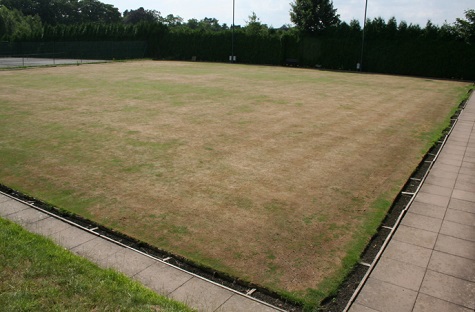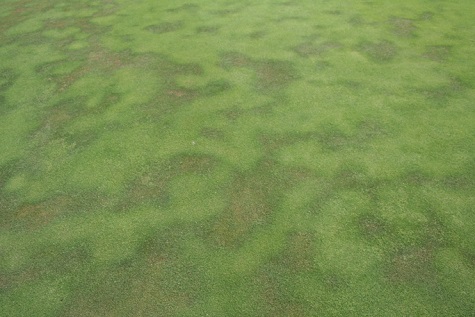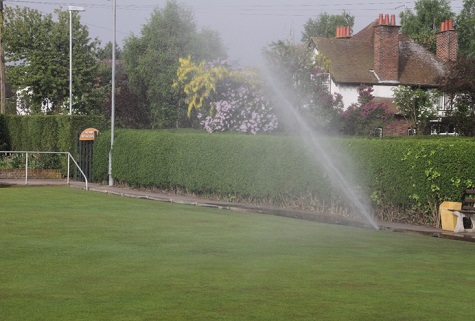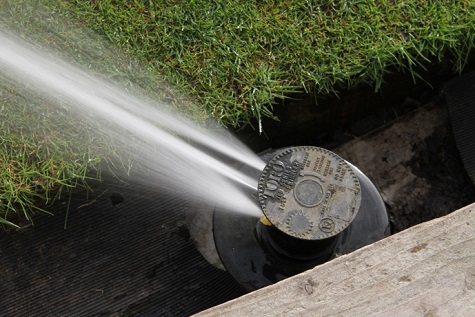The summer months of May, June, July and August are generally a busy period for both flat and crown green bowling greenkeepers, who are expected to produce exceptional playing surfaces often with limited resources and budgets - with many facing an onslaught of fixtures every week.
It has been a challenging spring and early summer with many parts of the country receiving little rain. Clubs have been relying on the fact they have decent irrigation facilities to maintain optimum grass growth.
Some clubs are even experiencing drought conditions already and there could even be a drought forecast if these dry conditions prevail. Some parts of the country have only had 3-4mm of rainfall compared to their normal average of 30 plus mm for the month.
Allowing your greens to dry out too much will bring on several problems, principally the fact that the grass plant goes into stress and can become dormant to protect itself, before finally dying.
I remember the results of long dry summers. The following set of photos illustrate the devastation of long dry periods.

The speed and smoothness of your greens will be influenced by the condition of the playing surface in terms of sward quality. This will be influenced by many factors including amount of grass cover, weed content, pest and disease and the level of input undertaken by the club’s greenkeeper.
However, the availability of water is an essential ingredient in the management and conditioning of grass playing surfaces. Nowadays, irrigation is an important and integral part of the turf grass management industry, especially as the demand for better quality playing surfaces has increased.

This demand has been largely due to extensive televised coverage of major sporting events. Seeing immaculate, aesthetically presented golf courses, football, rugby pitches and horse racing courses has increased the expectations of the players and viewers. Most professional sporting facilities have irrigation systems of one sort or another. Without them they would not be able to prepare and maintain their playing surfaces.
Irrigation is essential for a number of reasons:
- for plant survival and growth.
- for soil formation
- for soil strength
- for chemical transport
- for managing playability
- for presentation
Water is influential in all chemical, physiological and biological processes of plant growth. The soil/plant water relationships is critical to the sustainability of any grass plant. Understanding these relationships is critical. All grass plants are a continuum of water movement. Over 90% of the plant's water requirements are transported through the plant from the soil profile, via the roots and stem tissues into the leaves and out into the atmosphere. Knowledge of these relationships is important when designing and operating irrigation systems. The main aim is to achieve a water balance within the soil profile ensuring that the grass plant can access available water from the soil.
Key factors
Turf type and condition; healthy vigorous turf will transpire more water than an unhealthy turf plant.
Time of the year; there is likely to be more soil water present during the spring, autumn and winter months when temperatures are cooler coupled with higher levels of rainfall.
Weather; air temperature, daylight hours, solar energy inputs, wind speed and shading are factors that will affect evapotranspiration rates.
Maintenance regimes; keeping the soil open and aerated will increase the drainage capacity of the soil. On the other hand, compacted soils will prevent the movement of water through soils, often creating an environment that prevents water getting down into the soil profile. By carrying out effective regular maintenance regimes that include aeration, scarifying, harrowing, brushing, top dressing all help to keep the soil in good condition.

Water resources; quantity and quality. The quantity of water available, and the amount licensed for use in any one year, will determine the performance of any system and irrigation capabilities.
Facility type; design and construction. USGA greens perform differently to pushed up soil greens, each having different water and management requirements. Modern drainage systems also effect soil water conditions. Extensive drainage systems will freely drain water from the soil.
Turf professional’s knowledge; it is important that there is someone who understands all of the above parameters and can access the water requirements of the turf and correctly implement the right irrigation schedule for the facility.
Technology
Technology has moved on, and we now see a wide range of irrigation systems from stand alone, self-travelling or boom sprinklers to computer controlled high-tech pop-up gear driven or jet sprinkler systems able to deliver precise amounts of water.

All irrigation systems are driven by water pressure. It is important that the correct specification of piping is used to conform to the pressure requirements of the system being employed. Using the wrong size piping materials and UPVC joints could result in leakage problems once the system is up and running. Leaks and loss of pressure will have a dramatic effect on the performance of the system, with the added problem that the water will be going somewhere else!
Also, the quality of your water may affect the performance of your system. Sites in areas with heavy lime deposits may require filtration systems. Similarly, recycled water (grey water systems) will require an effective filtration system employed to clean the water prior to use on natural turf surfaces.
The desired application of water from any irrigation system will be fully dependant on irrigation scheduling. Proper irrigation scheduling is a difficult skill that surprisingly few groundsmen and greenkeepers have mastered. By far the largest loss or decline of turf grass quality on playing surfaces is the direct result of improper irrigation scheduling. You may be surprised to learn that the most common irrigation scheduling problem is not too little water, or even too much water, it is watering too frequently. Many of the common turf grass diseases are made worse by, or even may be the result of, watering too frequently. It is vitally important to understand the water needs of the plants and soil rootzone.

Like all mechanical and electrical equipment there is a need for maintenance. Regular inspections should be carried out to installations, man hole covers and pop up sprinkler heads looking for any damage or leaks. It is also important to periodically calibrate the system, checking the uniformity of the irrigation and ensuring that all sprinklers are working. Drops in water pressure or leaks will effect the delivery of the system, often leading to non-uniform watering, which may lead to dry spots and inconsistent surface playability.
Keep records and diaries of irrigation scheduling, running/operating times and performances of the facility. Records will play an important part in the future use of water, especially as this resource may become scarce or restricted.
Irrigation management and the optimisation of watering strategies are important to the proper maintenance of sports facilities. Insufficient moisture when soils reach soil water deficit will result in a declining quality of sward, or even death. Legislation is going to force the industry to control and manage this scarce resource, therefore the understanding and implementation of an irrigation strategy is a must for all clubs and organisations.
Far too often clubs fail to invest in decent irrigation systems and even if they have one, they seldom know how maximise it potential or fail to maintain it in good working order. These irrigation systems need to be constantly checked and maintained to ensure they are fit for purpose.